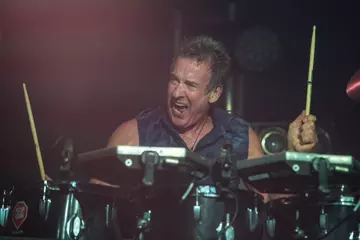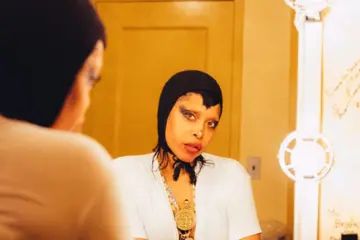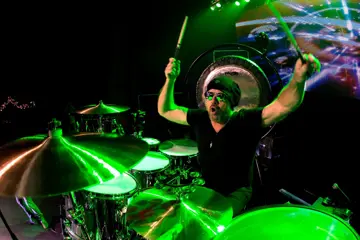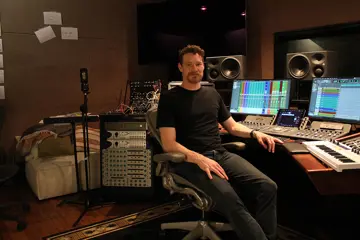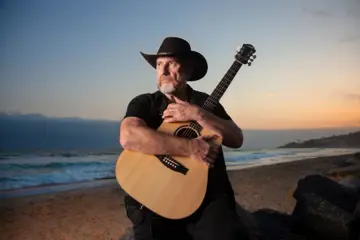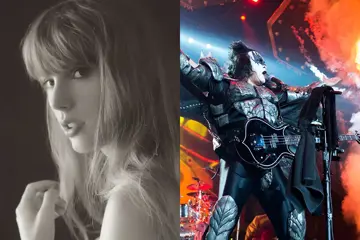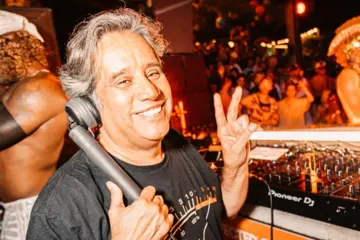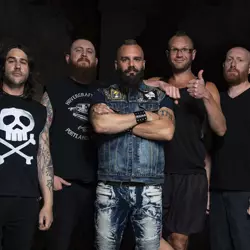 Killswitch Engage
Killswitch EngageKillswitch Engage's 2002 second album Alive Or Just Breathing was a legitimate heavy music game-changer. It represented a shifting of the tides away from nu-metal – a movement further solidified when the band appeared alongside upstarts such as Shadows Fall and Chimaira on the 2003 Ozzfest stateside. The Massachusetts melodic metalcore outfit has parlayed this early buzz into an enduring, two-decade career, with the gold records on their collective walls to prove it.
Frontman Jesse Leach left the ranks soon after Alive Or Just Breathing's release, eventually returning for 2013's Disarm The Descent. And in a crowd-pleasing touch, successor Howard Jones appears on a track on new record Atonement, their first LP since leaving long-time label Roadrunner. How does attaining “veteran” status make Leach feel, other than old?
“Old is a given, for sure,” he says from New York. “I think grateful, man. The fact that we've been doing this for 20 years and we're still doing it, how can you not be grateful for that? I haven't had to go find a normal job. Music has been paying my bills for the better part of seven years since I got back. So it's definitely gratitude, but also a little shock – like, how the hell is this still happening?”
The group ultimately struck a commercially appealing formula, and their trademark arena-sized hooks are apparent on Atonement. The record's genesis was problematic, however. For one, Leach experienced writer's block. He also underwent vocal cord surgery; the intense three-month recovery ended with speech therapy, vocal therapy, and scream therapy. “My voice feels better than ever, it's crazy,” the singer gushes. “I didn't realise that I had been singing on a broken instrument for so long.”
"We're not Rage Against The Machine, we're Killswitch."
Don't miss a beat with our FREE daily newsletter
These weren't the only obstacles. Leach has openly discussed his battles with anxiety and depression. In January, he announced that he needed time “to get help” after informing fans that he and his wife of over 16 years, Melissa, had decided to go separate ways. The singer took to Instagram to relay that he would be seeking treatment so that he could avoid becoming “another statistic of suicide”.
These setbacks impacted on the recording schedule for Atonement, and it's no surprise that the record features some of the most aggressive, cathartic fare the band have released in eons: “As far as the music goes, it wasn't conscious. Those guys wrote what they wrote. I think for me, it's just a real reflection of where I am with the state of the world, the state of the country, and things that happened in my personal life. There's a lot of anger, but righteous anger. It's a positive thing. I think anger can be used as a tool for change, and I think that's definitely reflected in this record."
“I think it's a decent amount, [but] it doesn't encompass the album as a whole,” Leach says of his mental health battles affording lyrical fodder. “I think there's enough political stuff mixed in there as well, and just aggression in general. I'm very careful with how I write to not be overtly political, and not be preachy about anything in particular. I try to write in such a way where it's poetic enough, and ambiguous enough where people can grab their own meaning and put their own idea to what I'm saying. That political, anarchist anger has definitely been spread through every single record that I've done in my career, and it's something that I feel very strongly about. But we're not Rage Against The Machine, we're Killswitch. It's one of the many things that encompasses the lyrics, alongside the existential thinking that I try to put in my lyrics as well.”
Recent trials have also perhaps led to Leach being an advocate of the benefits of taking the odd social media hiatus, with his first stint lasting several weeks. “I think people need to do that, you need to get off social media because you realise how much you're spending time staring at this phone that is dictating things to you, or comparing you to someone else, or making you feel envious of something," he shares.
“There's just so much that is misleading you, and taking you out of the moment. I think the moment that you take that hiatus and you are in the moment, you realise that human interaction is so important. And we're losing touch with it, because we're so busy interacting on these devices. These ones and zeros are manipulating us, and pushing this air of separation around us where our communication is devolving... I think everybody should take time, including myself – I'm yelling at myself as well – you've gotta take a break, and realise that we as a human species were not meant to be so connected to electronic devices. It's detrimental to our mental health.”


